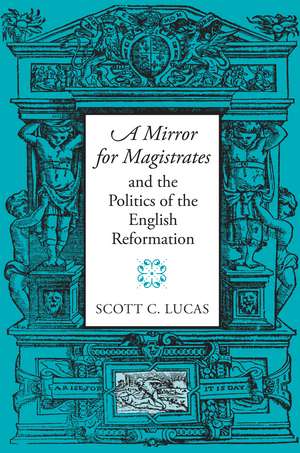"A Mirror for Magistrates" and the Politics of the English Reformation: Massachusetts Studies in Early Modern Culture
Autor Scott Lucasen Limba Engleză Hardback – 23 iul 2009
Perhaps no other work of secular poetry was as widely read in Tudor England as the historical verse tragedy collection A Mirror for Magistrates. For over sixty years (1559–1621), this compendium of tragic monologues presented in the voices of fallen political figures from England's past remained almost constantly in print, offering both exemplary warnings to English rulers and inspiring models for literary authors, including Spenser and Shakespeare.
In a striking departure from previous scholarship, Scott Lucas shows that modern critics have misconstrued the purpose of the tragic verse narratives of the Mirror, approaching them primarily as uncontroversial meditations on abstract political and philosophical doctrines. Lucas revises this view, revealing many of the Mirror tragedies to be works topically applicable in form and politically contentious in nature.
Lucas returns the earliest poems of A Mirror for Magistrates to the troubled context of their production, the tumultuous reign of the Catholic Queen Mary (1553–1558). As Protestants suffering from the traumatic collapse of King Edward VI's "godly" rule (1547–1553) and from the current policies of Mary's government, the Mirror authors radically reshaped their poems' historical sources in order to craft emotionally moving narratives designed to provide models for interpreting the political failures of Edward VI's reign and to offer urgent warnings to Marian magistrates.
Lucas's study also reveals how, in later poems, the Mirror authors issued oblique appeals to Queen Elizabeth's officers, boldly demanding that they allow the realm of "the literary" to stand as an unfettered discursive arena of public controversy. Lucas thus provides a provocative new approach to this seminal but long-misunderstood collection, one that restores the Mirror to its rightful place as one of the greatest works of sixteenth-century English political literature.
In a striking departure from previous scholarship, Scott Lucas shows that modern critics have misconstrued the purpose of the tragic verse narratives of the Mirror, approaching them primarily as uncontroversial meditations on abstract political and philosophical doctrines. Lucas revises this view, revealing many of the Mirror tragedies to be works topically applicable in form and politically contentious in nature.
Lucas returns the earliest poems of A Mirror for Magistrates to the troubled context of their production, the tumultuous reign of the Catholic Queen Mary (1553–1558). As Protestants suffering from the traumatic collapse of King Edward VI's "godly" rule (1547–1553) and from the current policies of Mary's government, the Mirror authors radically reshaped their poems' historical sources in order to craft emotionally moving narratives designed to provide models for interpreting the political failures of Edward VI's reign and to offer urgent warnings to Marian magistrates.
Lucas's study also reveals how, in later poems, the Mirror authors issued oblique appeals to Queen Elizabeth's officers, boldly demanding that they allow the realm of "the literary" to stand as an unfettered discursive arena of public controversy. Lucas thus provides a provocative new approach to this seminal but long-misunderstood collection, one that restores the Mirror to its rightful place as one of the greatest works of sixteenth-century English political literature.
Din seria Massachusetts Studies in Early Modern Culture
-
 Preț: 249.95 lei
Preț: 249.95 lei -
 Preț: 291.90 lei
Preț: 291.90 lei -
 Preț: 289.58 lei
Preț: 289.58 lei - 8%
 Preț: 347.91 lei
Preț: 347.91 lei -
 Preț: 259.35 lei
Preț: 259.35 lei -
 Preț: 258.73 lei
Preț: 258.73 lei -
 Preț: 215.42 lei
Preț: 215.42 lei -
 Preț: 246.31 lei
Preț: 246.31 lei -
 Preț: 250.72 lei
Preț: 250.72 lei
Preț: 299.69 lei
Nou
Puncte Express: 450
Preț estimativ în valută:
57.34€ • 60.03$ • 47.45£
57.34€ • 60.03$ • 47.45£
Carte indisponibilă temporar
Doresc să fiu notificat când acest titlu va fi disponibil:
Se trimite...
Preluare comenzi: 021 569.72.76
Specificații
ISBN-13: 9781558497061
ISBN-10: 1558497064
Pagini: 288
Ilustrații: 6
Dimensiuni: 152 x 229 x 28 mm
Greutate: 0.63 kg
Ediția:First Edition
Editura: University of Massachusetts Press
Colecția University of Massachusetts Press
Seria Massachusetts Studies in Early Modern Culture
Locul publicării:United States
ISBN-10: 1558497064
Pagini: 288
Ilustrații: 6
Dimensiuni: 152 x 229 x 28 mm
Greutate: 0.63 kg
Ediția:First Edition
Editura: University of Massachusetts Press
Colecția University of Massachusetts Press
Seria Massachusetts Studies in Early Modern Culture
Locul publicării:United States
Notă biografică
Scott Lucas is associate professor of English at The Citadel.
Recenzii
"This book makes a distinctive and important contribution to both Tudor literature and Tudor history and will be read by students of both. And it is written in excellent, jargon-free prose. I strongly recommend it."—Patrick Collinson, author of The Reformation: A History
"Scholars interested in the political work performed by early drama will benefit from Scott C. Lucas's radical rereading of one of the 'great texts' of the mid-sixteenth century, A Mirror for Magistrates."—The Year's Work in English Studies
"This elegant and insightful study opens the inner workings of a text of which many students of the sixteenth century will have heard, but comparatively few will have read: A Mirror for Magistrates. . . . Lucas has given readers a model of effective interdisciplinary scholarship, and one that will be much cited by historians and literary scholars alike."—The Historian
"Lucas's study of the topical allusiveness of A Mirror for Magistrates provides a new lens through which to view the early modern literature of political council. . . . The book is extremely well researched and informative, as Lucas carefully reconstructs the political context and timeline of the Mirror's production, demonstrating how the work served to bolster the evangelical cause in the wake of the precipitous fall of Edward Seymour from his position as Lord Protector in 1549 and subsequent execution in 1552."—The English Historical Review
"Throughout the book, Lucas seeks to examine "each [tragedy] for its individual purpose and function" . . . his book is comprehensive and convincing. . . . his focus on the individual tragedies is so compelling that one wants to know what he would have made of this central feature of the Mirror too. Like all of Lucas's publications, this book is meticulously researched, judiciously argued, clearly written, and very persuasive. For this reason, it should replace Campbell's baseline for criticism on the Mirror for a long time to come. For current students and scholars of Renaissance studies, the book should also serve as a mirror of excellence in research in its own right."—Journal of British Studies
"Scott C. Lucas's substantial book on the Mirror is the most thorough extended study of the Mirror yet. . . . Lucas's schoalrships should move scholars to reassess the complexities of the Mirror."—Renaissance Quarterly
"This is a valuable work of scholarship that will prove useful to both historians and literary critics of mid-Tudor literature relating to the religious controversies for which the period is known. . . . This work itself could serve as an example of careful scholarship and breath-taking insight. . . . It provides yet another piece in the puzzle of English Reformation studies as well as adding welcome nuance to a genre long considered transparent."—H-Net
"Informative and well researched, Lucas's book focuses on one of the most under-appreciated works of the mid-Tudor period, William Baldwin's . . . A Mirror for Magistrates. . . . His exposure of the animosities amongst the powerful aristocratic families engaged in the struggle to rule England encourages us to acknowledge the parallel between the 1550s and the early 14th and 15th centuries and breathes new life into Baldwin's text."—SHARP News
"Lucas is alert to the possibility that early-modern writers were more than willing to conceal their agendas behind 'innocent aesthetic endeavors,' and he does a splendid job of tracing the book's genesis and development. This is a fine example of an English professor teaching historians a lesson or two, and it is required reading for all students (whether literary or historical) of Reformation Britain."—Religious Studies Review
"The analyses of individual poems that Lucas provides are careful, detailed, painstaking, and plausible. It is hard to imagine anyone offering so exhaustive an account of the Mirror's contents . . ."—Modern Philology
"Scholars interested in the political work performed by early drama will benefit from Scott C. Lucas's radical rereading of one of the 'great texts' of the mid-sixteenth century, A Mirror for Magistrates."—The Year's Work in English Studies
"This elegant and insightful study opens the inner workings of a text of which many students of the sixteenth century will have heard, but comparatively few will have read: A Mirror for Magistrates. . . . Lucas has given readers a model of effective interdisciplinary scholarship, and one that will be much cited by historians and literary scholars alike."—The Historian
"Lucas's study of the topical allusiveness of A Mirror for Magistrates provides a new lens through which to view the early modern literature of political council. . . . The book is extremely well researched and informative, as Lucas carefully reconstructs the political context and timeline of the Mirror's production, demonstrating how the work served to bolster the evangelical cause in the wake of the precipitous fall of Edward Seymour from his position as Lord Protector in 1549 and subsequent execution in 1552."—The English Historical Review
"Throughout the book, Lucas seeks to examine "each [tragedy] for its individual purpose and function" . . . his book is comprehensive and convincing. . . . his focus on the individual tragedies is so compelling that one wants to know what he would have made of this central feature of the Mirror too. Like all of Lucas's publications, this book is meticulously researched, judiciously argued, clearly written, and very persuasive. For this reason, it should replace Campbell's baseline for criticism on the Mirror for a long time to come. For current students and scholars of Renaissance studies, the book should also serve as a mirror of excellence in research in its own right."—Journal of British Studies
"Scott C. Lucas's substantial book on the Mirror is the most thorough extended study of the Mirror yet. . . . Lucas's schoalrships should move scholars to reassess the complexities of the Mirror."—Renaissance Quarterly
"This is a valuable work of scholarship that will prove useful to both historians and literary critics of mid-Tudor literature relating to the religious controversies for which the period is known. . . . This work itself could serve as an example of careful scholarship and breath-taking insight. . . . It provides yet another piece in the puzzle of English Reformation studies as well as adding welcome nuance to a genre long considered transparent."—H-Net
"Informative and well researched, Lucas's book focuses on one of the most under-appreciated works of the mid-Tudor period, William Baldwin's . . . A Mirror for Magistrates. . . . His exposure of the animosities amongst the powerful aristocratic families engaged in the struggle to rule England encourages us to acknowledge the parallel between the 1550s and the early 14th and 15th centuries and breathes new life into Baldwin's text."—SHARP News
"Lucas is alert to the possibility that early-modern writers were more than willing to conceal their agendas behind 'innocent aesthetic endeavors,' and he does a splendid job of tracing the book's genesis and development. This is a fine example of an English professor teaching historians a lesson or two, and it is required reading for all students (whether literary or historical) of Reformation Britain."—Religious Studies Review
"The analyses of individual poems that Lucas provides are careful, detailed, painstaking, and plausible. It is hard to imagine anyone offering so exhaustive an account of the Mirror's contents . . ."—Modern Philology
